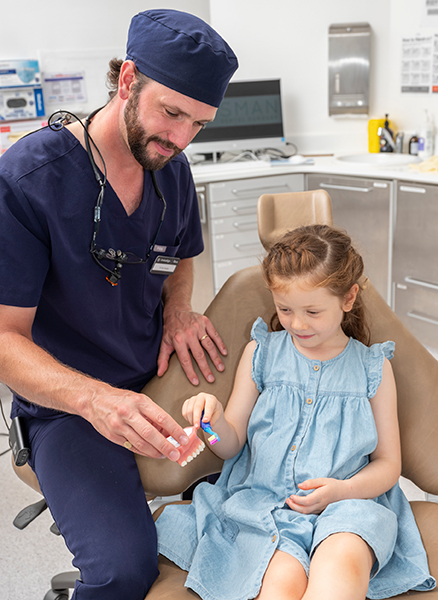Managing anxious children in a dental setting requires a combination of empathy, communication skills, and age-appropriate techniques. Here are some strategies that we often use at Mosman Dental Surgery:
- Establishing Trust: Building a trusting relationship with the child is crucial. We like to take the time to get to know the child, find common ground and even if the child just wants to sit in the waiting room or chair on the first visit that’s fine, we don’t like to push it too far and frighten them.
- Create a Comfortable Environment: We have light, bright, airy surgeries with Netflix on the televisions above the chairs
- Education and Explanation: Our dentists use lots of visual aids, models, or simple language to explain dental procedures to children. By helping them understand what will happen during their visit, it reduces the fear of the unknown.
- Start with a “Show and Tell”: We like a “show and tell” approach, where we demonstrate the tools and equipment to the child before using them. This allows the child to become familiar with the dental environment in a non-threatening way.
- Behavioural Guidance Techniques: Our team are trained to use behaviour management techniques that are suitable for children. Positive reinforcement, distraction techniques, and praise for good behaviour can help keep the child calm during the visit.
- Tell-Show-Do Approach: This involves explaining the procedure first, showing the child the instruments, and then performing the actual procedure. This step-by-step approach helps children feel more in control and aware of what’s happening.
- Involve the Parent or Guardian: Having a parent or guardian present during the appointment can provide emotional support for the child. We also provide guidance to parents on how to prepare the child for the visit and maintain good oral hygiene at home.
- Regular Check-ups: Encouraging regular dental check-ups from a young age helps normalize the experience for children. Routine visits for cleanings and examinations can reduce anxiety associated with dental appointments.
By combining these strategies, we aim to create a positive and supportive dental experience for anxious children, promoting good oral health habits that will last a lifetime.




Recent Comments